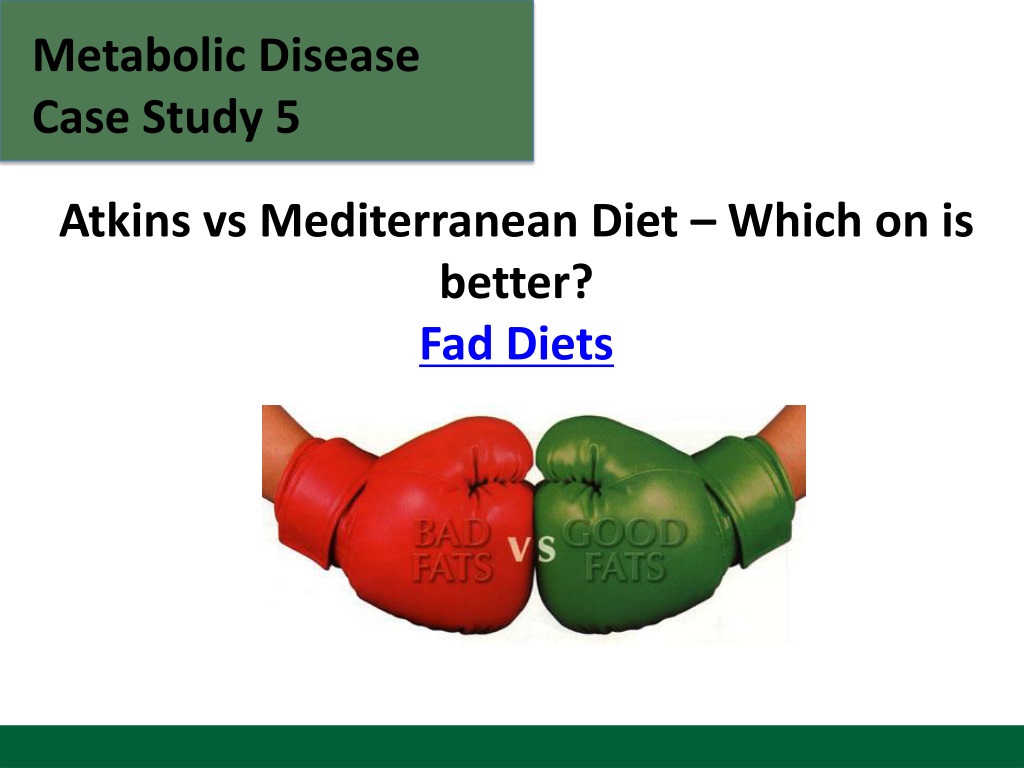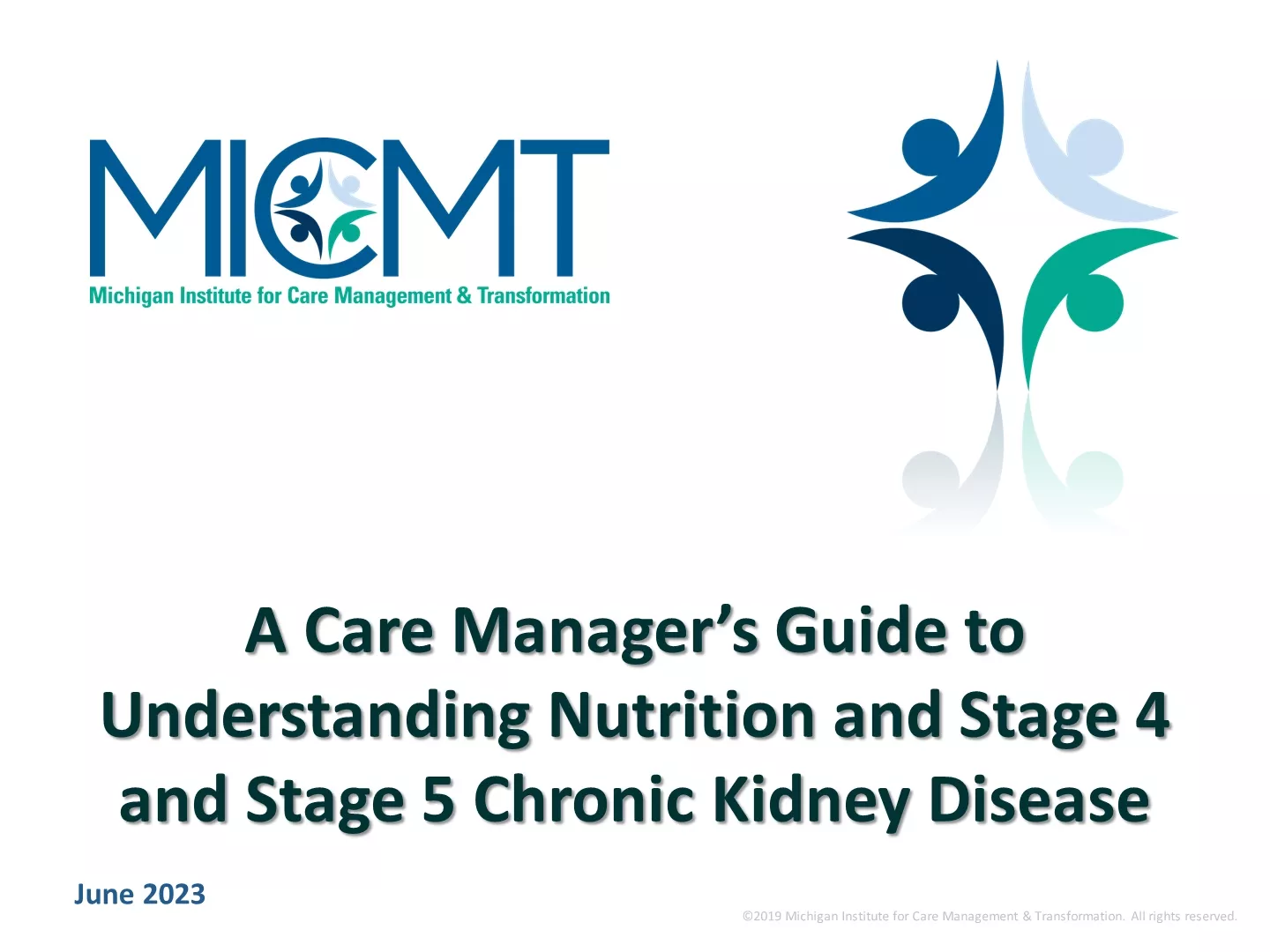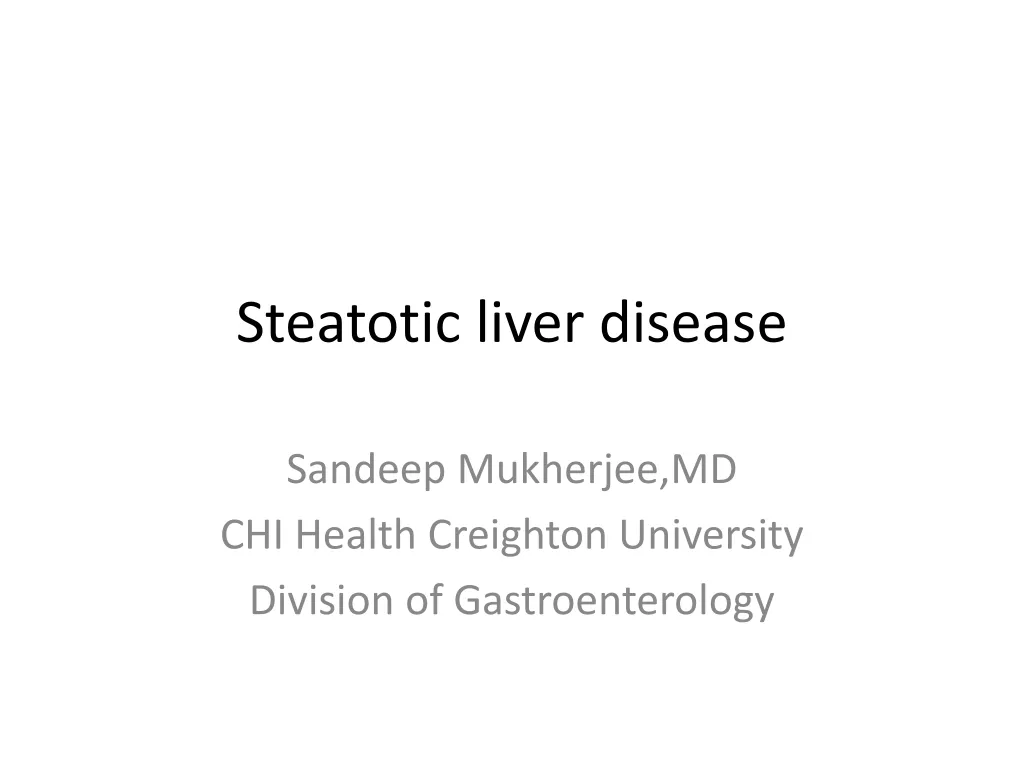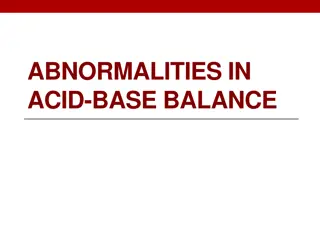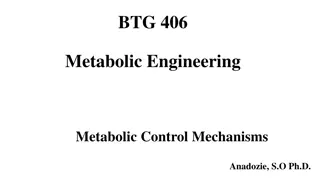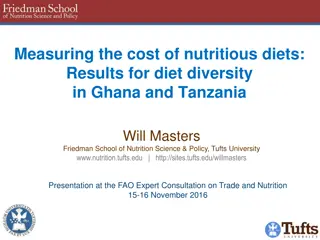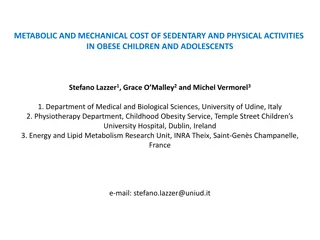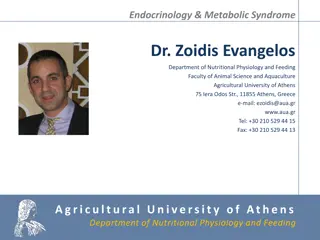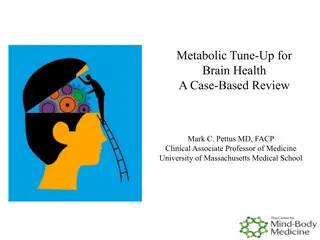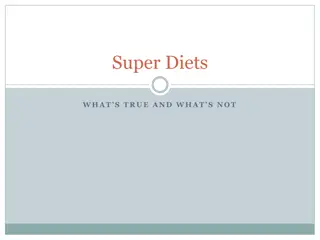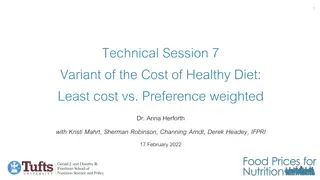Comparing Atkins and Mediterranean Diets for Metabolic Disease: A Case Study
In this case study, the Atkins and Mediterranean diets are compared in terms of their impact on metabolic health. The Atkins diet focuses on low carbohydrate intake, leading to gluconeogenesis and changes in insulin levels. On the other hand, the Mediterranean diet emphasizes unsaturated fats from plant oils and Omega 3 fatty acids. The study explores the health implications of these two popular diets to determine which one may be more beneficial for overall well-being.
Download Presentation

Please find below an Image/Link to download the presentation.
The content on the website is provided AS IS for your information and personal use only. It may not be sold, licensed, or shared on other websites without obtaining consent from the author. Download presentation by click this link. If you encounter any issues during the download, it is possible that the publisher has removed the file from their server.
E N D
Presentation Transcript
Metabolic Disease Case Study 5 Atkins vs Mediterranean Diet Which on is better? Fad Diets
Learning Objectives At the end of today s lesson you will be able to: Explain how experimental design produces limitations in the ability to interpret results Explain that if a study does not prove causation the data may support more than one conclusion Explain how limitations in experimental design account for the fluid nature of nutritional information provided by the media
Do Now What is the Atkins diet? What is the Mediterranean diet?
Mediterranean Diet Atkins Diet No sugars or carbohydrates! Low in saturated fats No trans-unsaturated fats! Unlimited fat and protein Unsaturated fats are OK
Consequences of Atkins Diet No carbs = no glucose available to maintain homeostasis in the blood SO ..the liver will need to make glucose from amino acids (gluconeogenesis) AND the pancreas will release glucagon to tell the liver and muscles to unstore glycogen AFTER 24 hours of this, organs (other than your brain) will break down amino acids and fat Low insulin levels also will affect satiety signals (so you don t feel full)
Fats Saturated fats: Animal fats Always solid Cis unsaturated fats: Plant oils Usually liquid Trans unsaturated fats: Don t occur naturally Usually solid
Mediterranean Diet Atkins Diet Low in saturated fats No trans-unsaturated fats No sugars or carbohydrates! Unlimited fats and protein Some unsaturated fats are OK How can they both be healthy?
Case Study Worksheet Diets: Which One is Best? The Atkins diet was developed 40 years ago with the purpose of controlling satiety by increasing consumption of fats and protein while severely limiting consumption of carbohydrates and sugars. While this diet has become very popular in Western countries, many people have questioned whether it can be healthy. On the other hand, the "Mediterranean" diet, entails eating foods that substitute unsaturated fats found in plant oils and Omega 3 fatty acids for saturated fats. Advocates of this diet argue that consumption of saturated fats, commonly found in foods of animal origin high in protein and fat, and encouraged in the Atkins diet, will lead to an increased risk of cardiovascular disease
Diets: Which One is Best? 1. Based on your understanding of nutrition and metabolism, what hypothesis would you make about the health consequences of the two diets? 2. How would you set up an experiment to test your hypothesis? Who would you include in the study? What would the conditions of the study be? What would you measure?
Two studies evaluated the diets The two publications we will study examined two cohorts of people based upon their adherence to an Atkins-like diet or a Mediterranean style diet. Both publications examined the relationship between the diet and cardiovascular diseases. .
Based on your hypothesis what would you predict? 3. Draw a bar graph showing the results you would expect to see if your hypothesis is correct. Total CVD Incidence (% of Cohort) 50 45 40 35 30 25 4. Prepare to discuss your graph with the rest of the class and provide reasoning for the relationship between diet and cardiovascular disease. 20 15 10 5 0 Atkins Mediterranean Column1
Real data from two studies! 5. What does the data suggest? 3. 6. Is this consistent with your predictions? If not, why might this be? 2. 45"+6 ,78- ,9 % : $ ) ( % : ( , ;< ,5= ,75>5*"? 1. 0. 7. What additional information would allow you to make more conclusions about the data? / . . ! "#$ % & ' ( ) $ "( **+% ( +% ,- $ ( "
Two studies evaluated the diets The two publications we are studying examined two cohorts of people based upon their adherence to an Atkins-like diet or a Mediterranean style diet. Both publications examined the relationship between the diet and cardiovascular diseases. 8. How would you determine how well someone adhered to the diets?
Predict the next result 9. Note there are two Y-axes on the graph, one for Mediterranean and one fore Atkins. Draw a line graph showing the results you would expect to see if your initial hypothesis was correct. 10. Prepare to discuss your predictions with the class. "$ % & $ ' () *+, - . / *(. 001+. 1+2 3*. ( < = 2 7> 2 - . / *(. 001+. 1+2 97470(? % " 67(18 2 9: 32 ;+5*/ . +5. 2 < = 2 7> 2 ' () *+, 2 97470(? 67(18 2 9: 32 ;+5*/ . +5. 2 #& " % $ #& $ #" ! & " #$ ! " ! & $ 3*. (2 ' / 4. 0. +5.
Real data from two studies! 11. How does diet adherence affect health outcomes? 12. Is this consistent with your initial prediction? "$ % & $ ' () *+, - . / *(. 001+. 1+2 3*. ( < = 2 7> 2 - . / *(. 001+. 1+2 97470(? % " 67(18 2 9: 32 ;+5*/ . +5. 2 < = 2 7> 2 ' () *+, 2 97470(? 67(18 2 9: 32 ;+5*/ . +5. 2 #& " 13. Do the new results affect the initial data at all? % $ #& $ #" ! & " #$ ! " ! & $ 3*. (2 ' / 4. 0. +5.
Real data from two studies! Mediterranean Diet If we use one axis to draw the same graph we can see the the Mediterranean diet group had a far higher CVD incidence to begin. 50 Atkins 45 Total CVD Incidence 40 35 30 25 20 15 10 5 0 Diet Adherence
Who did the studies use as subjects? The Atkins diet cohort study examined a population of 49,261 Swedish women aged 30-49 living around the Uppsala region who responded to a questionnaire that was mailed out to 96,000 total women. The Mediterranean diet study examined two cohorts of Dutch people. The MORGEN cohort was 22,654 Dutch men and women aged 20-65 who were recruited through random population sampling in Amsterdam, Maastricht, and Doetinchem. The second cohort, PROSPECT, was 17,357 Dutch women aged 50-70 who participated in a breast cancer screening program. In all cohorts, any individuals who had pre-existing conditions for cardiovascular disease were removed from this study. Food and drink intake was assessed by survey in all three cohorts, and subgroups were organized based upon degree of adherence to a certain diet.
Who did the studies use as subjects? How might the experimental design be improved to make the results from the 2 groups more comparable?
Wrap Up Do we need to re-evaluate what we know about how fat metabolism contributes to health? Why do you think nutritional messages are always changing?
